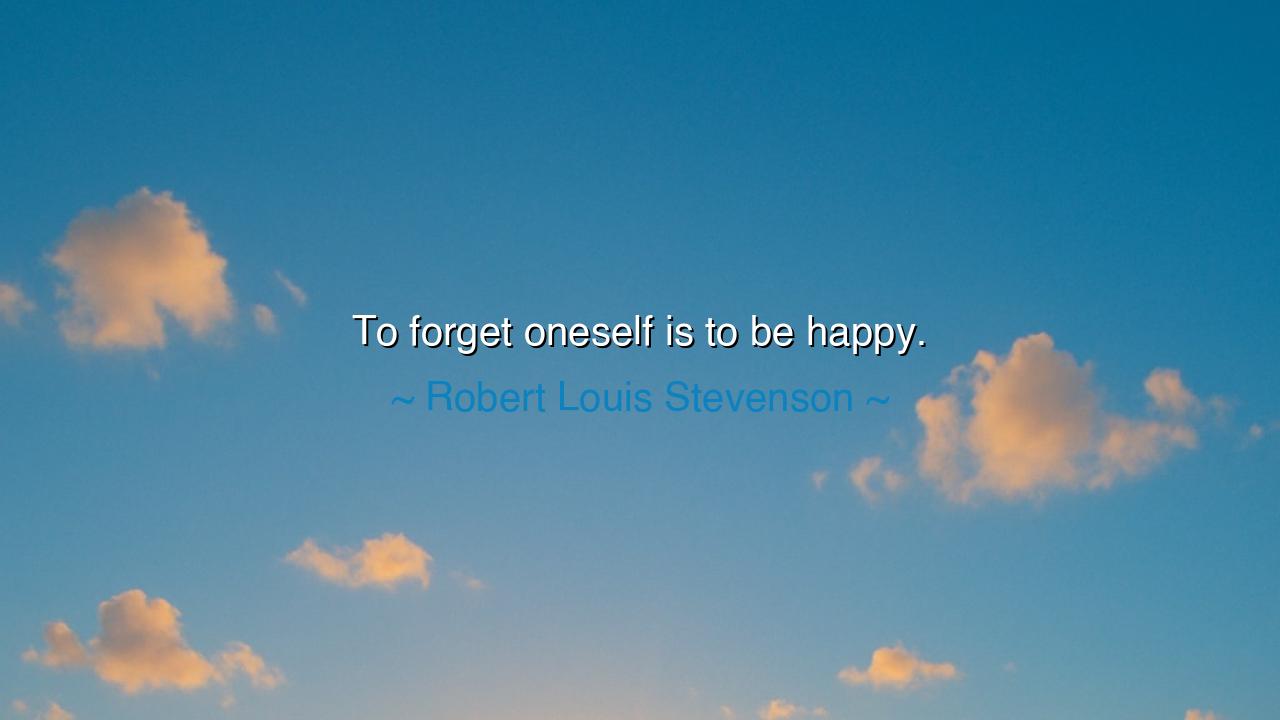
To forget oneself is to be happy.






Hear now the gentle and eternal wisdom of Robert Louis Stevenson, the wanderer, the dreamer, the poet of the human heart, who once wrote: “To forget oneself is to be happy.” In this saying lies a truth so profound that few grasp it, though all have felt its whisper. For Stevenson, who lived through sickness, struggle, and ceaseless travel, had looked deeply into the soul and seen that happiness is not found in self-absorption, but in self-forgetfulness — that to be truly alive, one must turn outward, away from the narrow prison of ego, toward life, love, and others. To forget oneself is not to vanish, but to awaken to the greater whole of which we are a part.
Born in Scotland in the 19th century, Stevenson was a man of frail body but mighty spirit. His words, though written in an age of empire and exploration, speak to every time and every soul. He knew what it was to suffer — plagued by illness, haunted by solitude — yet through it all he found a serenity that others, far more fortunate, often lack. How? By learning that the mind that dwells only upon itself becomes a storm; but the mind that looks outward becomes clear and radiant as the sky after rain. He taught, by word and by life, that joy comes when we lose ourselves in the act of living — in work, in art, in friendship, in service.
When Stevenson said, “To forget oneself is to be happy,” he was not calling for the destruction of self, but for the liberation of self. The ego — that constant voice of fear, desire, and comparison — binds us to suffering. It tells us we are never enough, never satisfied, never safe. To forget oneself is to silence that voice and listen instead to the hum of existence — to the music of the world around us. The artist forgets himself when he creates; the mother forgets herself when she loves; the saint forgets herself when she gives. In those moments of pure attention, the walls of the self fall away, and happiness enters as naturally as sunlight through an open window.
Consider the story of Florence Nightingale, the Lady with the Lamp. She did not seek fame, nor did she dwell on her own comfort. In the filth and horror of the Crimean War, she walked through the wards at night, tending the wounded and forgotten. She forgot herself utterly in service, and in doing so found the strength to bring healing where there had been despair. Her joy was not in glory, but in giving. The same spirit moved Stevenson, who believed that the truest life is lived not in the pursuit of pleasure, but in the quiet radiance of purpose.
So too, in our own age, we see how the self, when worshipped, becomes a tyrant. The modern world teaches us to measure, to compare, to crave — to make an idol of our reflection. But the more we gaze inward with vanity or fear, the more we lose our peace. We chase after happiness as if it were a possession, yet it flees the moment we clutch it. Stevenson’s wisdom reminds us that happiness cannot be grasped; it can only be entered. And the door to it opens not inward, but outward — through compassion, through curiosity, through engagement with the life around us.
To forget oneself is also to forgive oneself — to cease the endless self-judgment that poisons the heart. The person who constantly measures their worth can never rest. But when we pour our energy into love, creation, or service, we stop asking whether we are worthy, and instead become useful and alive. Like the stream that forgets itself as it nourishes the fields, the human soul finds its meaning in what it gives away. The secret of peace, then, is not in isolation but in participation — in becoming part of something larger than the self.
Thus, the teaching of Robert Louis Stevenson shines like a lantern through the centuries: “To forget oneself is to be happy.” If you wish to know peace, lose yourself in what you love. If you wish to feel alive, give yourself wholly to the moment before you. Look less at the mirror and more at the horizon. Speak kindly, serve gladly, create bravely — and let the self dissolve into the act. For in the forgetting of yourself, you will find the greater self — the one that is vast, free, and eternal.
So, my child, take this wisdom to heart. Do not chase happiness as a treasure to be owned. Instead, live deeply and let the self slip away like mist before the morning sun. Forget yourself in wonder, in kindness, in work that matters — and happiness will find you, not as a fleeting visitor, but as a faithful companion on the road of life. For to forget oneself is not to lose life — it is to finally begin to live it.






AAdministratorAdministrator
Welcome, honored guests. Please leave a comment, we will respond soon